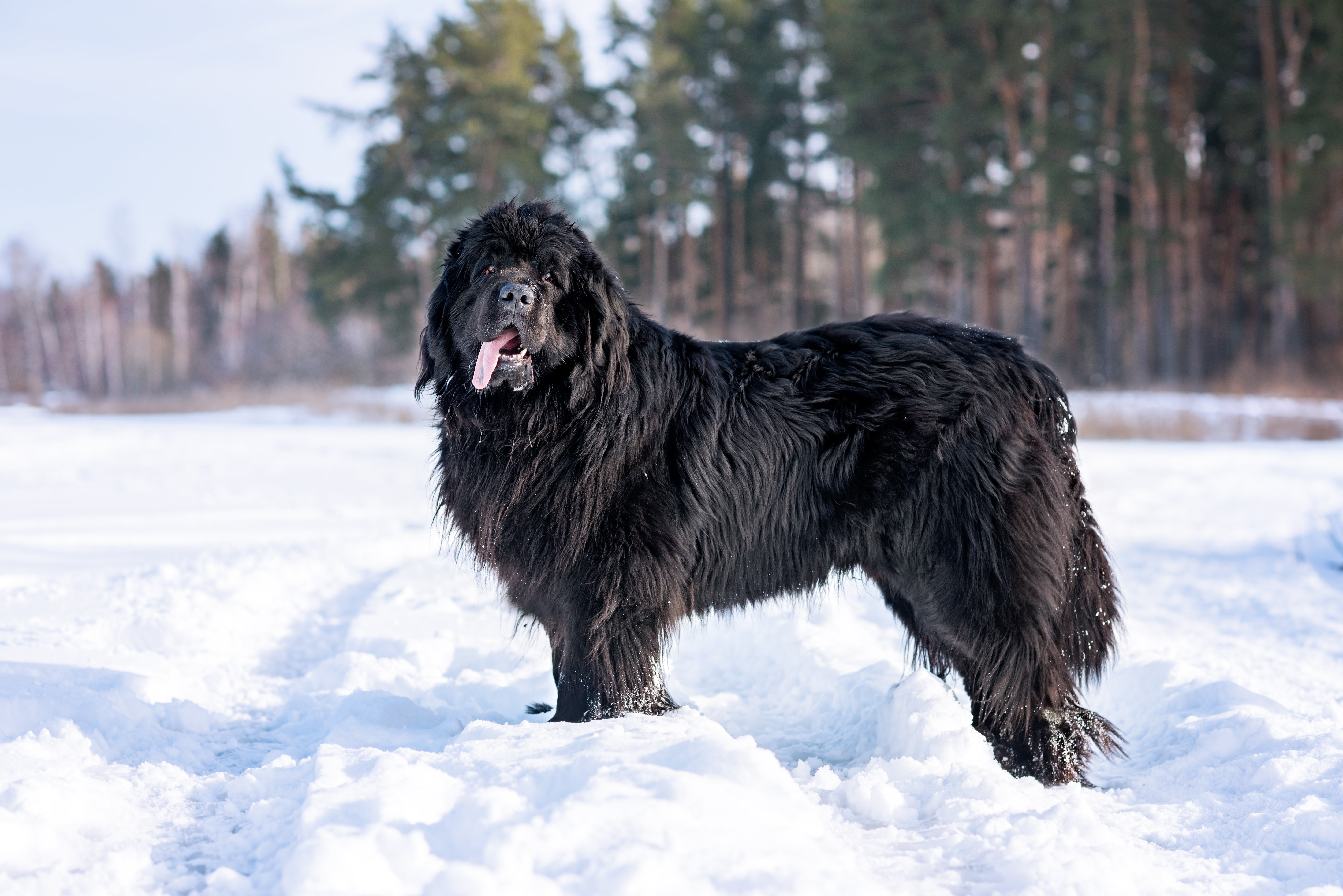Newfoundland
These massive, powerful working dogs are known for their impressive size and dignified presence, but beneath their imposing stature lies a sweet-tempered soul. Newfoundlands, affectionately called "Newfies," have earned a reputation as patient and watchful companions, especially around children. Their gentle nature makes them a favorite among families. These large, heavily-boned dogs are known for their strength, historically used to pull carts and rescue people from the water. Their thick double coat, with a soft undercoat and a water-resistant outer layer, keeps them warm and comfortable.
Breed characteristics carousel
Learn More
Need to Know
- Suitable for experienced owners
- Extra training required
- Potential health issues
- Enjoys vigorous walks
- Giant dog
- Some drool
- Requires regular grooming
- Quiet dog
- Barks and alerts to visitors or anything unusual
- Could have issues with unknown dogs but gets along with known dogs
- May need additional training to live with other pets
- May need additional supervision to live with children
- Needs a large yard
- Can live in semi-rural areas
- Can be left alone occasionally with training
- AKC Registered Breed

Personality
The Newfoundland's most defining characteristic—besides their large physical size— is their gentle and affectionate temperament. These calm, easygoing, and patient pups are known for their friendly demeanor, making them wonderful companions for everyone they meet. Their loyalty extends to their family, where they act as caring protectors.
The Newfoundland's story unfolds in the 18th-century Newfoundland. They likely emerged from a mix of European Pyrenean Mountain Dogs and local Eskimo Huskies, perfectly adapted to the harsh, cold climate. Initially used as working dogs, their strength and pulling abilities made them invaluable companions for fishermen. However, their natural affinity for water—coupled with their webbed feet and water-resistant coat—soon became evident.
Newfoundlands became legendary for their lifesaving heroics. These courageous canines would readily plunge into frigid waters to rescue drowning sailors. One Newfie was famously awarded a medal for bravery in 1919 after rescuing 92 people from a shipwreck. Although their seafaring days have largely diminished, Newfoundlands remain prized water rescue dogs around the world.
Owning a Newfoundland is a commitment for the dedicated dog lover. These oversize sweethearts require an "XL" lifestyle—from spacious living areas to sizable food bowls. Their love for water means owners who enjoy spending time by the pool or splashing in the waves will find a perfect companion. However, patience is key, as Newfoundlands retain their playful puppy energy for nearly three years.
Be prepared for some drool, long drying times after swims, and regular grooming that might require DIY skills as some professional groomers can't accommodate their massive size. Despite these considerations, the rewards are plentiful. Newfoundlands are loving companions who adore their families and will bring immense joy to any owner who can provide for their unique needs.
Daily exercise is important for these big guys, but it doesn't have to be strenuous. A moderate walk or short playtime will suffice to keep them healthy and content. Their love for water is undeniable, making swimming a fantastic exercise option that brings them joy (just be prepared for long drying times thanks to their thick double coat).
Due to their massive size, Newfoundlands are not suited for apartment living. These kind-hearted canines require ample space to roam and play, both indoors and outdoors. Newfoundlands are happiest in cooler climates, as their dense fur makes them less tolerant of hot weather.
While undeniably majestic, the Newfoundland's double coat comes with significant grooming needs. Their dense, water-resistant fur requires thorough brushing at least once a week, with daily sessions recommended during shedding seasons, which generally occurs twice a year; however, spayed and neutered Newfoundlands shed year-round and need to be brushed out several times a week. The nails should be trimmed regularly, as overly long nails can cause discomfort and structural problems.
Newfoundlands generally respond well to training. However, their strength means mastering obedience isn't their forte. Focus on teaching basic commands to ensure you can control this gentle giant. Newfies are affectionate and trust-building, so avoid harsh corrections and focus on kind guidance.
The Newfoundland's gentle nature makes them ideal companions for families with children. Nicknamed the "nanny dog" for their patience and protectiveness, these giants are devoted to their families and will shower children with love and attention. Their calm and easygoing temperament makes them perfect playmates for youngsters, while their size can also provide a sense of security.
The cost of a Newfoundland from a breeder is significantly more than the cost of adopting one from a local shelter or rescue. The adoption fee usually covers additional items such as spaying or neutering, vaccines, and microchipping.

Learn more about feeding and caring for your Newfoundland on Purina.
Did You Know?
- JM Barrie further established the reputation of Newfoundlands as the perfect dog for children in his book Peter Pan, in which a Newfoundland named Nana acts as the children’s nanny.
- Newfoundlands are natural-born swimmers, with webbed feet and a water-resistant double coat. They have a heroic history of rescuing people from drowning, earning them the nickname "lifesaver dogs."
- In 1802, a Newfoundland named Seaman accompanied Lewis and Clark on their historic expedition, proving invaluable as a guard dog and even saving them from a charging buffalo. Today, Seaman is depicted in 10 different Lewis and Clark monuments across the U

